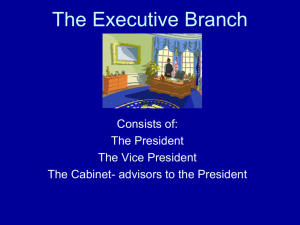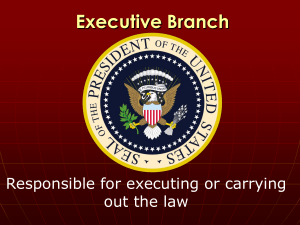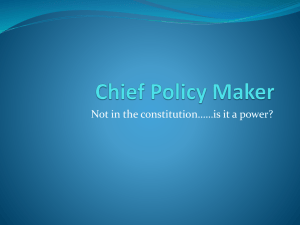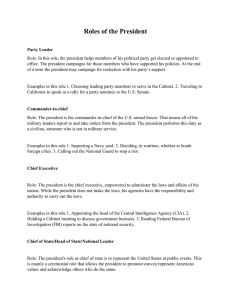Unit 4: The Presidency
advertisement
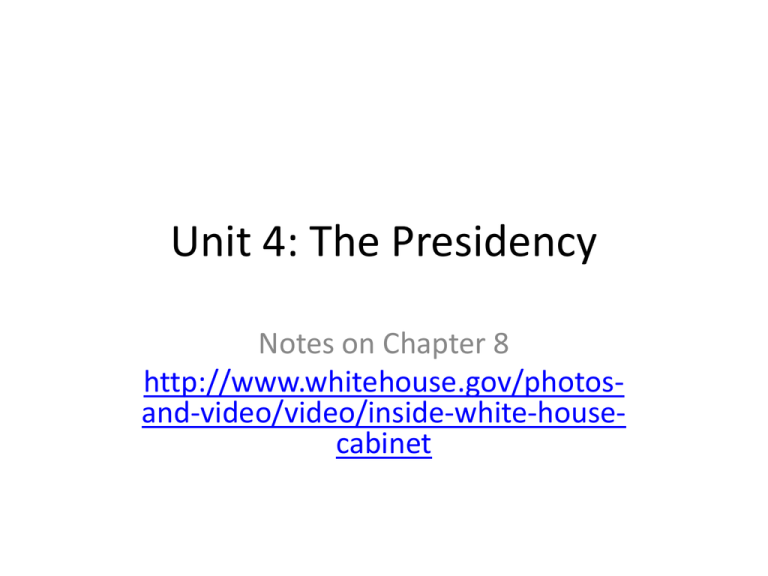
Unit 4: The Presidency Notes on Chapter 8 http://www.whitehouse.gov/photosand-video/video/inside-white-housecabinet Qualifications of the President and Vice President • 35 years old • Born in the U.S. • Lived in the U.S. for 14 years Know this guy. President’s salary and benefits • Congress raised the president’s salary (beginning in 2001) to $400,000/year + $100,000 in travel allowance. • For travel, Air Force One, helicopters, and bullet proof limos are provided. • Free room and board at the White House, free medical, dental, and health care • Pension of 148k/year, survivor benefit to 1st lady of 20k/year 22nd Amendment (1951) • Limits the president to 2 four year terms or 10 total years should one assume the role for a president who could not finish a term. • This amendment was the result of F.D.R. winning 4 terms as president, breaking tradition of leaving after two terms. Role of V.P. according to the Constitution • Serve as President of the Senate and break any ties concerning the passage of legislation. • Assist in the determination of whether or not a sitting president is able to continue his duties. (25th Amendment) • The 25th Amendment also outlines the order of Presidential succession. (V.P., Speaker, Pres. Pro Tempore, Sec. of State) The Electoral College • The 12th Amendment- requires that electors cast separate ballots for President and V.P. • Except for Maine and Nebraska, the candidate who wins the popular vote in a state gets all of that state’s electoral votes (usually). • This is a “winner-take-all” system and has on occasion elected a president who did not win the popular vote throughout the country. Powers of the President: Article II of the Constitution • Grant pardons except in cases of impeachment. • Appoints heads of the executive departments with the advise and consent of the Senate. • Creates treaties with the advise and consent of the Senate. The Cabinet • The President appoints members to this board, but many factors influence his appointments. • Made of the heads of the 15 major executive departments, and some of the heads of the independent agencies, and the V.P. Know this guy. The Executive Office of the President • Created by FDR in 1939, the EOP is more loyal to the President than the Cabinet. • The EOP assists the President more with policy creation rather than policy implementation. • Some dept. of the EOP are National Security Council, Office of National Drug Control Policy, National Economic Council, Office of Science and Technology Policy, Domestic Policy Council, and the Office of Management and Budget (OMB) • The head of the EOP is the President’s Chief of Staff Know this guy Roles of the President • • • • • • • Chief of State Chief Executive Chief Legislator Chief Economic Planner Party Leader Chief Diplomat Commander in Chief Head of State • Refers to the President’s ceremonial duties • Entertaining other heads of state • Throwing out the 1st pitch of the baseball season • Lighting the Christmas tree • Giving out medals Chief Executive • The President is in charge of all executive departments. • Direct supervision of the millions of employees is impossible. • Executive orders- president uses these to express his intention of how laws are to be carried out. • President delegates responsibility thru appointments • Impoundment- President refuses to spend money appropriated by Congress Chief Legislator • The President can suggest legislation for Congress to focus on. • Influences legislation in the State of the Union address and other public speeches. • Meets with Congressmen and appoints staff to assist with bill creation. • Veto power Economic Planner • Office of Management and Budget (OMB) prepares the nation’s budget each year. • Decides what programs to cut, where to increase spending, and the size of the federal deficit. Party Leader • President supports his party through speech making and support for other members running for office. • Patronage- the president is expected to fill many appointments with party members. Chief Diplomat • The President Directs foreign policy, outlining the U.S. relationship with other countries • Making treaties • Executive Agreements-like treaties, but no Senate approval, may be secret and therefore not published in the Federal Register. • Recognizing Governments, or not (like Cuba) Commander in Chief • The President is in charge of the Army, Navy, Air Force, Marines, and Coast Guard. • With the Approval of Congress, the President can declare war. • The President controls strategy of war, including the use of atomic weapons. • War Powers Act- President can commit troops to combat for only 60 days without Congress’ approval. Ch 10, section 1 Independent Regulatory Commissions vs. Independent Regulatory Agencies Independent Agencies Independent Commissions • Over 100 independent organizations that are not part of the cabinet dept. but under the executive branch. • President still appoints heads and has authority to remove them. • Ex: CIA, EPA and over 60 gov’t corporations like TVA, FDIC, USPS • Not part of any branch of gov’t to reduce political influence. • President appoints and Senate approves heads, but they serve long terms of office and can’t be removed. • Regulate industries and business that affect public interest. • Ex: SEC, FCC, FAA, Fed. Reserve Board Know which Cabinet Department each of these Executive Agencies are part of, or coordinate with! • • • • • • • FBI and DEA- Dept. of Justice Census Bureau- Commerce Dept. IRS- Treasury Dept. OSHA- Dept. of Labor FEMA- Dept. of Homeland Security FDA- Dept. of Health and Human Resources DRL (Bureau of Democracy, Human Rights, and Labor)- State Dept. • FAA- Dept. of Transportation Ch 10, section 2 Bureaucracy and Civil Service • Federal Bureaucracy- everyone who works for a department within the executive branch of government • Spoils System- another word for patronage, appointing supporters to gov’t positions • Civil Service system- refers to getting a government job on the basis of examination and merit. Pendleton Act (1883) • This act created the civil service system after President Garfield was shot by Charles Guiteau, who believed he was owed a job for supporting Garfield’s campaign. Hatch Act (1939) • Limits how involved federal employees can be in the election process. • Cons: the law limits free speech of federal employees. • Pros: it protects them from political pressure from supervisors Ch 10, Section 3: Iron Triangles • exist when executive/independent gov’t agencies, Congressional committees, and interest groups cooperate to pass laws. • Agencies rely on Congress for their budget and laws supportive to the desires of the agency. • Congress relies on interest groups for campaign support. • Ex: Dept. of V.A., House/Senate Committees on Veteran’s Affairs, and the American Legion • http://www.youtube.com/watch?v=wQ1KjkaRXpk
